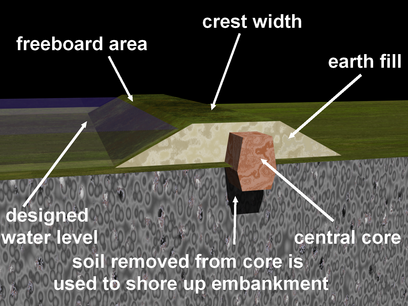| This article needs additional citations for verification. Please help improve this article by adding citations to reliable sources. Unsourced material may be challenged and removed. Find sources: "Flood embankment" – news · newspapers · books · scholar · JSTOR (June 2016) (Learn how and when to remove this message) |
A flood embankment is traditionally an earth wall used to shore up flood waters.
Most flood embankments are between 1 metre and 3 metres high. A 5-metre-high (16 ft) flood embankment is rare.
Modern improvements to this design include constructing an internal central core made from impermeable substance like clay or concrete, some even use metal pilings.
Some authorities call man-made structures levees.
Problems
| Animation of types of floodwall failures | |
|---|---|
| Overtopping
some flood embankments are designed to overtop |
 |
| When not by design, the crest can wash away and cause a breach |  |
| Structural failure
If any weakness is detected under strong water pressure, the compromise is soon exacerbated |
 |
| Rotation
When the structure has moved of its axis causing an exposed area to be washed away |
 |
| Sliding
When the structure has moved sideways exposing the foundation to erosion as well as allowing gaps in between the structures |
 |
| Seepage
When water infiltrates under the structure. This is caused by burrowing animals like dogs, beavers,badgers and otters |
 |
| Piping
When water finds its way under the structure and collects on the other side. A central core is normally designed in to prevent piping |
 |
Examples

Clifton, Rawcliffe, Poppleton and Leeman ings in York
Animation
This is an animation showing a flood event overwhelming neighbouring properties and the added construction of a flood embankment and flood warning and protection status.
References
- "Chapter 9". evidence.environment-agency.gov.uk. Archived from the original on 2016-06-24. Retrieved 2016-05-01.
- "Chapter 9". evidence.environment-agency.gov.uk. Archived from the original on 2016-06-24. Retrieved 2016-05-01.

